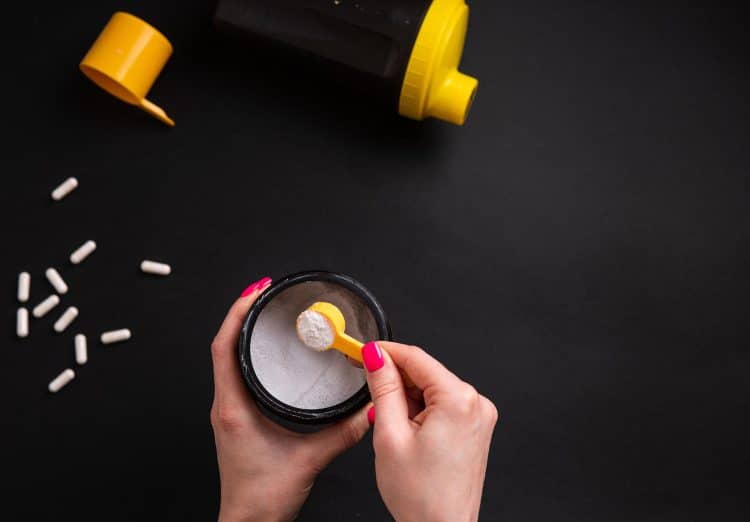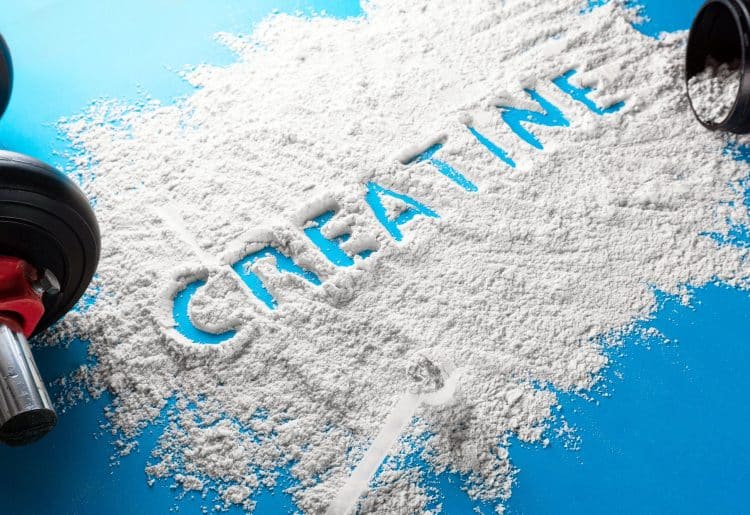There’s ongoing discussion about creatine supplementation, its effects, and how long it remains in your body. Creatine is an amino acid derivative created in your cells and is also consumed as a supplement. If you’re wondering, “How long does creatine stay in your system?”, this comprehensive guide has you covered.
Concerns about potential side effects of creatine supplementation, such as its impact on kidneys, have led to questions about its duration in the body. While numerous studies highlight the therapeutic benefits of creatine, some debate its effects on renal function. [1]
This article goes into the details influencing creatine retention, its benefits, potential side effects, and how to optimize your supplementation effectively. Authored by our editor-in-chief Ash Khan, in-house expert, Dr. Rashmi Byakodi, and reviewed by certified nutritionist Nuala McBride, you can trust the information is accurate and reliable.
How Quickly Does Creatine Leave Your System?
Creatine levels in your muscles may deplete within two weeks after you stop taking it. However, it isn’t eliminated all at once. It takes about six weeks for the excess creatine to be fully cleared from your body.
Research suggests that half of the excess creatine is typically removed from the plasma approximately three hours after ingestion. This means that about 50% of your creatine dose is eliminated from your plasma within three hours of consumption. [3]
In healthy adults, creatine has a half-life of around 3.85 hours in the plasma. While exogenous creatine and its metabolites are generally cleared from the plasma within 24 hours after stopping supplementation, complete excretion via the kidneys could take up to 24 hours. Some studies suggest that about 2% of supplemented creatine may be retained for extended periods.
For athletes and fitness enthusiasts, creatine supplementation enhances performance. However, experts recommend periodic breaks. The usual recommendation is to discontinue creatine for four weeks after 12 weeks of continuous use. This cycling allows your body to maintain natural creatine production without relying solely on supplementation.
Factors Influencing Creatine Retention
As creatine enters the bloodstream after being synthesized in the liver and kidneys, it is distributed to muscle tissues. Research reveals that approximately 95% of all creatine stores in the body are concentrated within the skeletal muscle tissue. [4]
You can’t hold on to the same amount of creatine in your plasma or muscle tissue. Some people eliminate it faster than others, which depends on how much creatine you take, how it’s administered, and even your genetics.
Individual Attributes Affecting Creatine Stores
Several individual factors affect creatine retention:
- Body Composition: Individuals with higher muscle mass and water content may store more creatine, leading to longer retention periods. Those with lower muscle mass may eliminate creatine more quickly.
- Age: Metabolic rate can decrease with age, potentially affecting how quickly creatine is processed.
- Health Conditions: Liver and kidney functions are crucial in creatine metabolism and excretion. Individuals with hepatic or renal impairments may retain creatine longer than those with normal organ function. [5]
How Does Creatine Schedule Affect Creatine Stores?
Your creatine supplementation schedule significantly impacts how long creatine stays in your system.
During the loading phase—when you’re taking higher doses of 20-25 grams per day—it may take up to one month for your body to achieve saturation levels. If you discontinue creatine during this phase, excretion occurs more rapidly.
In contrast, during the maintenance phase—taking lower doses of 3-5 grams per day—your muscles are saturated with creatine. Stopping supplementation at this stage may take longer for creatine levels to return to baseline due to higher intramuscular stores.
Higher dosages result in greater amounts of creatine circulating in the blood for extended periods and are excreted at a slower rate than smaller amounts.

How to Clear Creatine from Your System
It’s essential to monitor your body’s response when taking any new supplement. If you experience discomfort while using creatine, consider discontinuing its use and consult a healthcare professional for personalized advice. Generally, it takes up to 30 days for creatine levels to return to baseline after stopping supplementation.
While some suggest that activated charcoal or calcium-D-glucarate could aid in eliminating creatine from your system, these methods should only be considered under medical supervision due to potential risks. [6] [7]
There are no specific methods to significantly expedite the elimination of creatine from your system. Staying well-hydrated, maintaining a balanced diet, and engaging in regular physical activity support your body’s natural metabolic processes.
Is Creatine Harmful?
Studies generally do not indicate significant side effects from creatine consumption when taken in recommended amounts. However, creatine should be consumed as required by your body. Check out our [creatine calculator](https://fitnessvolt.com/creatine-calculator/) to determine how much creatine is appropriate for you. If you’re a beginner and unsure how much creatine to start with, consulting a health professional is advisable.
Benefits of Creatine
Creatine not only boosts athletic performance and muscle mass but also supports overall health. It increases phosphocreatine stores in muscles, aiding in the production of adenosine triphosphate (ATP), the primary energy molecule during high-intensity exercise.
Typically, individuals take 3-5 grams of creatine per day during the maintenance phase. Supplementation can enhance strength, promote muscle growth, and may reduce levels of myostatin—a protein that inhibits muscle development—thereby enhancing your muscle-building potential.
How to Consume Creatine to Maximize Results
To maximize creatine absorption and benefits:
- Combine with Carbohydrates and Protein: Consuming creatine with carbohydrate and protein-rich meals can enhance uptake into muscle cells. [2]
- Follow Proper Dosage Protocols: Begin with a loading phase of 20 grams per day (split into four 5-gram doses) for 5-7 days to saturate muscle stores, followed by a maintenance dose of 3-5 grams per day.
- Timing: While creatine can be effective when taken at any time, some studies suggest post-workout consumption may enhance benefits.
Achieving the required creatine intake from food alone is challenging, so supplementation is necessary to optimize your muscle creatine stores.
Frequently Asked Questions
What is the most common side effect of creatine supplementation?
Transient water retention during the early stages of supplementation is a common side effect. Creatine draws water into muscle cells, which may lead to slight weight gain. Some individuals may also experience minor side effects like stomach discomfort, dehydration, or muscle cramps. Staying well-hydrated and adhering to recommended dosages can minimize these effects.
Can creatine cause hair loss until it is eliminated from the body?
Currently, there is no definitive scientific evidence that creatine directly causes hair loss. However, some studies indicate that creatine may increase dihydrotestosterone (DHT) levels, a hormone associated with hair loss in individuals genetically predisposed to male pattern baldness. [8] More research is needed to confirm this effect. Most users do not experience hair loss from creatine supplementation.
Will I gain weight after consuming creatine?
Yes, you may experience weight gain after starting creatine supplementation. This initial weight gain is primarily due to water retention in muscle cells as creatine draws water into muscles. It’s a normal response and indicates that your muscles are becoming saturated with creatine. Over time, creatine can contribute to increases in lean muscle mass through enhanced performance and training adaptations.
Learn more about Creatine:
Final Words
Your BMI, metabolism, and overall health significantly influence how long creatine stays in your system. Individuals with higher muscle mass may retain creatine longer, while those with kidney-related issues might experience slower elimination. Metabolic rate also affects creatine retention.
We recommend using our creatine calculator or consulting a health expert to determine the ideal amount of creatine for your body type before using this supplement.
References
Fitness Volt is committed to providing our readers with science-based information. We use only credible and peer-reviewed sources to support the information we share in our articles.
- Kreider, R. B., Jäger, R., & Purpura, M. (2022). Bioavailability, Efficacy, Safety, and Regulatory Status of Creatine and Related Compounds: A Critical Review. [Link]
- Crim, M. C., Calloway, D. H., & Margen, S. (1976). Creatine Metabolism in Men: Creatine Pool Size and Turnover in Relation to Creatine Intake. [Link]
- Francaux, M. (n.d.). Kinetics of Plasma Creatine After an Ingestion of 2 g Creatine. [Link]
- Wilder, N., Deivert, R. G., Hagerman, F., & Gilders, R. (2001). The Effects of Low-Dose Creatine Supplementation Versus Creatine Loading in Collegiate Football Players. [Link]
- Jo, E., Judelson, D. A., & Earnest, C. P. (2019). Effects of Creatine Supplementation on Renal Function. [Link]
- ClinicalTrials.gov. (n.d.). Role of Activated Charcoal in Decreasing Blood Urea, Creatinine and Phosphorous. [Link]
- Douglas Laboratories. (n.d.). Calcium D-Glucarate. [Link]
- van der Merwe, J., Brooks, N. E., & Myburgh, K. H. (2009). Three Weeks of Creatine Monohydrate Supplementation Affects Dihydrotestosterone to Testosterone Ratio in College-Aged Rugby Players. [Link]
Tip: If you're signed in to Google, tap Follow.












Will consuming creatine effect the creatinine level in a Metabolic Panel test?
Yes, taking creatine supplements can affect the creatinine level in a metabolic panel test. Creatinine is a byproduct of creatine metabolism and is used as a marker of kidney function in a metabolic panel test. Elevated creatinine levels can indicate kidney dysfunction, but the use of creatine supplements can artificially increase creatinine levels and result in a false positive.
It was a useful article, thanks
I just had a question, what is the best creatine brand in Asia?
Thank you for finding the article useful! In order to assist you better with your question about the best creatine brand in Asia, could you please specify your country?
Can too much creatine cause muscle cramps?
Hi Jo M,
Thanks for reaching out! While creatine is generally safe, excessive intake can sometimes lead to muscle cramps, primarily due to dehydration. Creatine increases water retention in muscles, making it crucial to stay well-hydrated. If you’re considering taking creatine or experiencing cramps, consulting a healthcare professional for personalized advice is advisable.